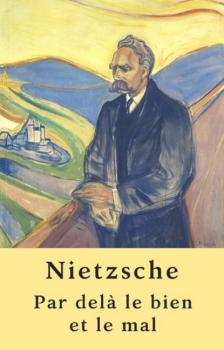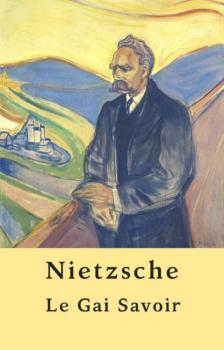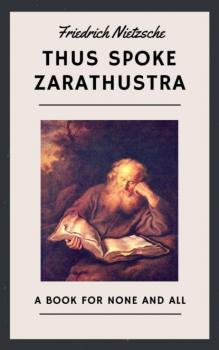Friedrich Nietzsche
Список книг автора Friedrich NietzschePar delà le bien et le mal (Édition annotée)
" La volonté du vrai, qui nous égarera encore dans bien des aventures, cette fameuse véracité dont jusqu'à présent tous les philosophes ont parlé avec vénération, que de problèmes cette volonté du vrai n'a-t-elle pas déjà soulevés pour nous ? Que de problèmes singuliers, graves et dignes d'être posés ! C'est toute une histoire – et, malgré sa longueur il semble qu'elle vient seulement de commencer. Quoi d'étonnant, si nous finissons par devenir méfiants, si nous perdons patience, si nous nous retournons impatients ? Si ce Sphinx nous a appris à poser des questions, à nous aussi ? " Les neuf parties de " Par delà le bien et le mal " sont composées de 296 aphorismes, une forme que Nietzsche privilégie habituellement. Le titre se place dans une perspective immoraliste de la morale et des préjugés moraux. Il s'agit de dépasser " la croyance aux oppositions des valeurs " (aphorisme 2) qui, selon lui, n'est qu'un préjugé de métaphysicien. Nietzsche écrivit " Par delà le bien et le mal " pendant l'été de 1885 à Sils-Maria et pendant l'hiver suivant à Nice.
Le Gai Savoir
" Ce livre aurait peut-être besoin d'autre chose que d'un avant-propos, car en fin de compte un doute continuerait à subsister malgré tout, savoir si l'on pourrait rendre sensible par des préfaces, à quelqu'un qui n'a pas vécu quelque chose d'analogue, ce qu'il y a d'aventure personnelle dans ce livre. Il semble être écrit dans le langage d'un vent de dégel : on y trouve de la pétulance, de l'inquiétude, des contradictions et un temps d'avril, ce qui fait songer sans cesse au voisinage de l'hiver, tout autant qu'à la victoire sur l'hiver, à la victoire qui arrive, qui doit arriver, qui est peut-être déjà arrivée…" Dans sa préface, Nietzsche contextualise son projet. Il parle de ses provenances, toutes des soupçons et des souffrances morales, faisant explicitement référence à une certaine appréhension de la psychologie en tant que libératrice des affres de la maladie. De l'antiquité grecque, qu'il affectionne particulièrement pour ce que les Grecs anciens auraient été, de son avis philologique, " superficiels… par profondeurs ! ". Il passe également par la conjecture que les personnes de sa trempe sont destinées à vivre une existence tragique, ressentie comme une délivrance, se mettant en opposition " au troupeau ", qui se nourrirait de certitudes satisfaites. Le titre " Le Gai Savoir " fait référence aux troubadours, l'expression Gai Saber de laquelle dérive la gaya scienza étant une façon de dénommer en occitan l'art de composer des poésies lyriques.
Così parlò Zarathustra
Nietzsche utilizza la figura dell'antico profeta persiano per collegare e sviluppare i 4 elementi principali su cui poggia l'intera sua opera, tutti ampiamente discussi in questo libro definito insieme «per tutti e per nessuno». Dal punto di vista dell'originale Zoroastro tutti gli esseri umani si trovano in condizione d'uguaglianza di fronte all'unico Dio: poco prima della morte di Dio, tutti gli individui risultano uguali in quanto folla, gregge anonimo. Conseguentemente la morte di Dio è una possibilità d'espressione per il futuro superuomo. Nel 3° paragrafo della Prefazione il profeta definisce l'uomo come un ponte lanciato in direzione del superuomo: «L'uomo è qualcosa che dev'essere superato», per l'avvento del superuomo è pertanto necessaria la caduta finale dell'uomo attualmente presente in questo mondo. Ma ad un tale sforzo creativo d'allevamento e formazione non è possibile giunger sostando nel bel mezzo della piazza, dove s'assembra la folla sterminata e senza alcun valore di sorta: questa folla la quale in cambio di vantaggi e beni materiali (il «benessere») fa solo ciò che favorisce il proprio personale beneficio di guadagno e tornaconto individualistico.
Ainsi parlait Zarathoustra
Zarathoustra est le nom avestique de Zoroastre, prophète et fondateur du zoroastrisme, l'ancienne religion perse. En allemand, il garde cette forme ancienne. Nietzsche l'a choisi car il fut le premier à enseigner la doctrine morale des deux principes du bien et du mal. Ainsi, symboliquement, Zarathoustra abolit-il lui-même sa propre doctrine : " On ne m'a pas demandé – mais on aurait dû me demander —, ce que signifie dans ma bouche, dans la bouche du premier immoraliste, le nom de Zarathoustra, car c'est juste le contraire qui fait le caractère énormément unique de ce Perse dans l'histoire. Zarathoustra, le premier, a vu dans la lutte du bien et du mal la vraie roue motrice du cours des choses. La transposition en métaphysique de la morale conçue comme force, cause, fin en soi, telle est son œuvre. Mais cette question pourrait au fond être considérée déjà comme une réponse. Zarathoustra créa cette fatale erreur qu'est la morale ; par conséquent il doit aussi être le premier à reconnaître son erreur. " Le livre comporte quatre parties, et commence par un prologue. Selon le traducteur Henri Albert, chaque partie fut composée en une dizaine de jours. Néanmoins, les brouillons des textes infirment cette affirmation, et Nietzsche voulait sans doute parler de la phase finale d'écriture.
Also sprach Zarathustra
Zarathustra ist ein Einsiedler, der nach Jahren der Einsamkeit und Selbstbesinnung seine Bergwelt verlässt, um den Menschen seine Weisheit mitzuteilen. Auf seinem Weg begegnet ihm ein Weiser, der, allein im Wald, mit Gott sein Glück gefunden hat. Zarathustra wendet sich schnell von ihm ab und wundert sich, dass der Greis noch nicht vernommen hat, dass Gott tot ist.
Jenseits von Gut und Böse
mehrbuch-Weltliteratur! eBooks, die nie in Vergessenheit geraten sollten.
Jenseits von Gut und Böse war das Denken in der prähistorischen Zeit, in der Handlungen nach ihrer Wirkung beurteilt wurden. Die Moral kam erst, als man Handlungen nach ihrer Absicht beurteilte. Nietzsches Forderung war, wieder zu der Perspektive der vormoralischen Zeit zurückzukehren.
Zur Genealogie der Moral
mehrbuch-Weltliteratur! eBooks, die nie in Vergessenheit geraten sollten.
Die Genealogie der Moral besteht aus einer Vorrede und drei Abhandlungen, von denen die dritte die längste ist. Das Werk, das aus einer Vorrede und drei «Abhandlungen» besteht, gehört zu den einflussreichsten Schriften Nietzsches. Er legte hier keine Aphorismen vor wie in den meisten anderen seiner Werke, sondern längere, systematische Texte mit durchaus wissenschaftlichem Anspruch: Er stellt darin soziologische, historische und psychologische Thesen auf. Nietzsche wollte anders als klassische Moralphilosophen keine Moral herleiten oder begründen, sondern die geschichtliche Entwicklung und die psychischen Voraussetzungen bestimmter moralischer Wertvorstellungen nachvollziehen. Er fragt also nicht, wie die Menschen handeln sollten, sondern warum Menschen (Einzelne oder Gruppen) glauben, sie sollten auf bestimmte Weise handeln, oder andere dazu bringen wollen, so oder so zu handeln.
Friedrich Nietzsche: Beyond Good and Evil (English Edition)
"To love one's enemies? I think that has been well learnt: it takes place thousands of times at present on a large and small scale; indeed, at times the higher and sublimer thing takes place:—we learn to DESPISE when we love, and precisely when we love best; all of it, however, unconsciously, without noise, without ostentation, with the shame and secrecy of goodness, which forbids the utterance of the pompous word and the formula of virtue. Morality as attitude—is opposed to our taste nowadays. This is ALSO an advance, as it was an advance in our fathers that religion as an attitude finally became opposed to their taste, including the enmity and Voltairean bitterness against religion (and all that formerly belonged to freethinker-pantomime). It is the music in our conscience, the dance in our spirit, to which Puritan litanies, moral sermons, and goody-goodness won't chime."
In «Beyond Good and Evil» Friedrich Nietzsche accuses past philosophers of lacking critical sense and blindly accepting dogmatic premises in their consideration of morality. It was first published in 1886. «Beyond Good and Evil» exposes the deficiencies of those usually called «philosophers» and identifies the qualities of the «new philosophers»: imagination, self-assertion, danger, originality, and the «creation of values».
Also sprach Zarathustra
Friedrich Nietzsche – Also sprach Zarathustra Friedrich Nietzsche – Also sprach Zarathustra Da vor Gott alle Menschen gleich waren, Gott jedoch laut Friedrich Nietzsche tot ist, besteht diese Gleichheit der Menschen nur noch vor dem Pöbel. Der Weg ist somit frei für Nietzsches Konzept des Übermenschen. Dieser zeichnet sich durch Selbstüberwindung, Disziplin und Bildung aus. Er ist schöpferisch tätig und strebt nach Vollendung. Ebenfalls lehnt Friedrich Nietzsche das «Knechtsein» und das «Schwache» ab.
Friedrich Nietzsche: Thus Spoke Zarathustra (English Edition)
Elisabeth Förster-Nietzsche, Friedrich Nietzsche's sister: "Zarathustra" is my brother's most personal work; it is the history of his most individual experiences, of his friendships, ideals, raptures, bitterest disappointments and sorrows. Above it all, however, there soars, transfiguring it, the image of his greatest hopes and remotest aims. My brother had the figure of Zarathustra in his mind from his very earliest youth: he once told me that even as a child he had dreamt of him. At different periods in his life, he would call this haunter of his dreams by different names; «but in the end,» he declares in a note on the subject, «I had to do a PERSIAN the honour of identifying him with this creature of my fancy. Persians were the first to take a broad and comprehensive view of history. Every series of evolutions, according to them, was presided over by a prophet; and every prophet had his 'Hazar,'—his dynasty of a thousand years.»
"Zarathustra" by Friedrich Nietzsche was composed in four parts between 1883 and 1885. The book comprises a philosophical work of fiction whose style often lightheartedly imitates that of the New Testament and of the Platonic dialogues.









